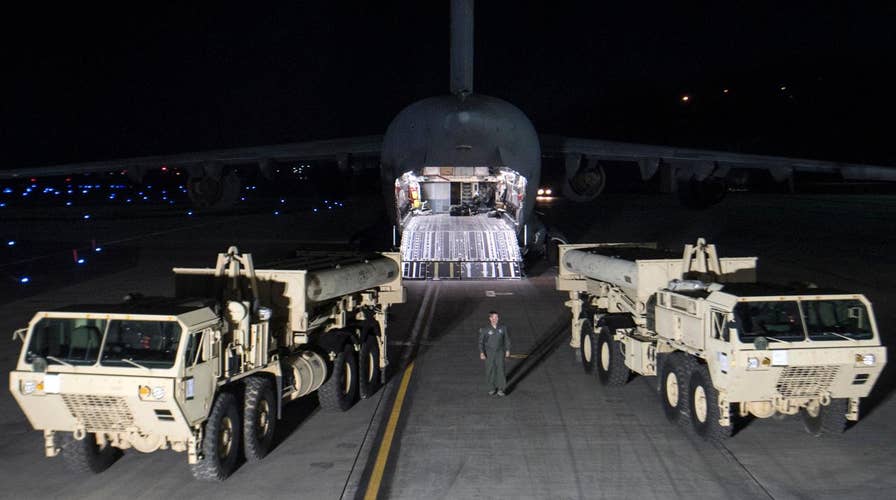US deploys missile defense system to South Korea
Amb. John Bolton breaks down move, pushback from China on 'America's Newsroom'
The U.S. decision to send equipment needed to set up a controversial missile defense system in South Korea is likely to add to tensions with Beijing and Moscow, countries that have spoken out in the past about deploying the system.
China said Tuesday it would take measures against the U.S. missile system deployed in South Korea, and that the U.S. and Seoul would bear the consequences.
NORTH KOREA COULD HALT NUKE PROGRAM IF SOUTH KOREA, PENTAGON STOP MILITARY DRILLS, CHINA CLAIMS
"China firmly opposes the deployment of THAAD," Chinese Foreign Ministry spokesman Geng Shuang said. "We will definitely be taking necessary measures to safeguard our own security interest. All consequences entailed from that will be borne by the U.S. and (South Korea). We once again strongly urge the relevant sides to stop the process of deployment and refrain from going further down that wrong path."
Lou Yuan, an outspoken, retired Chinese general, wrote in the Global Times, a state-run paper, that the Chinese military “could conduct a surgical hard-kill operation that would destroy the target, paralyzing it and making it unable to hit back,” The New York Times reported.
VIDEO: PENTAGON WAGING SECRET EFFORT AGAINST NORTH KOREA MISSILE PROGRAM
He went on, “Since the United States, Japan and South Korea choose not to respect China’s major security concerns, China does not need to be a gentleman on everything."
Washington and Seoul says the Terminal High-Altitude Area Defense system, or THAAD, is not meant to be a threat to China or Russia. The U.S. military said in a statement that THAAD can intercept and destroy short and medium range ballistic missiles during the last part of their flights.
Kim Yong-hyun, a professor of North Korean Studies at Seoul’s Dongguk University, told The Korean Times that it is “apparent that China is trying to draw its two Cold War allies to its side, at least over THAAD-related issues. It will also highlight the alliance between South Korea and the U.S. as well as their ties with Japan as part of tactics against THAAD.”
On Monday, North Korea fired four ballistic missiles in an apparent protest against ongoing U.S.-South Korean military drills that it views as an invasion rehearsal. The missiles flew about 620 miles on average, three of them landing in waters that Japan claims as its exclusive economic zone, according to South Korean and Japanese officials.
But China and Russia see the system’s powerful radars as a security threat.
An official from South Korea's Defense Ministry, who didn't want to be named, citing office rules, said that the equipment that arrived in South Korea included launchers, but didn't confirm how many.
While South Korea's media speculate that the THAAD deployment could be completed by as early as April, the ministry official couldn't confirm those reports. The official said that the plan was to have the system operational as soon as possible.
China's condemnation of South Korean plans to deploy THAAD has triggered protests against South Korean retail giant, Lotte, which agreed to provide one of its golf courses in southern South Korea as the site of THAAD. The South Korean government also raised worries about a reported ban on Chinese tour groups visiting the country.
On Tuesday, China's Global Times, an outspoken nationalist tabloid published by the ruling Communist Party's flagship People's Daily, criticized North Korea over the missiles.
"By firing four missiles at once this time, the military confrontation between Pyongyang, Seoul and Washington escalates a notch," the paper said. "Noticeably, the Chinese public is angry that Pyongyang's nuclear program has provided an excuse for Seoul to deploy THAAD."
The Associated Press contributed to this report.
